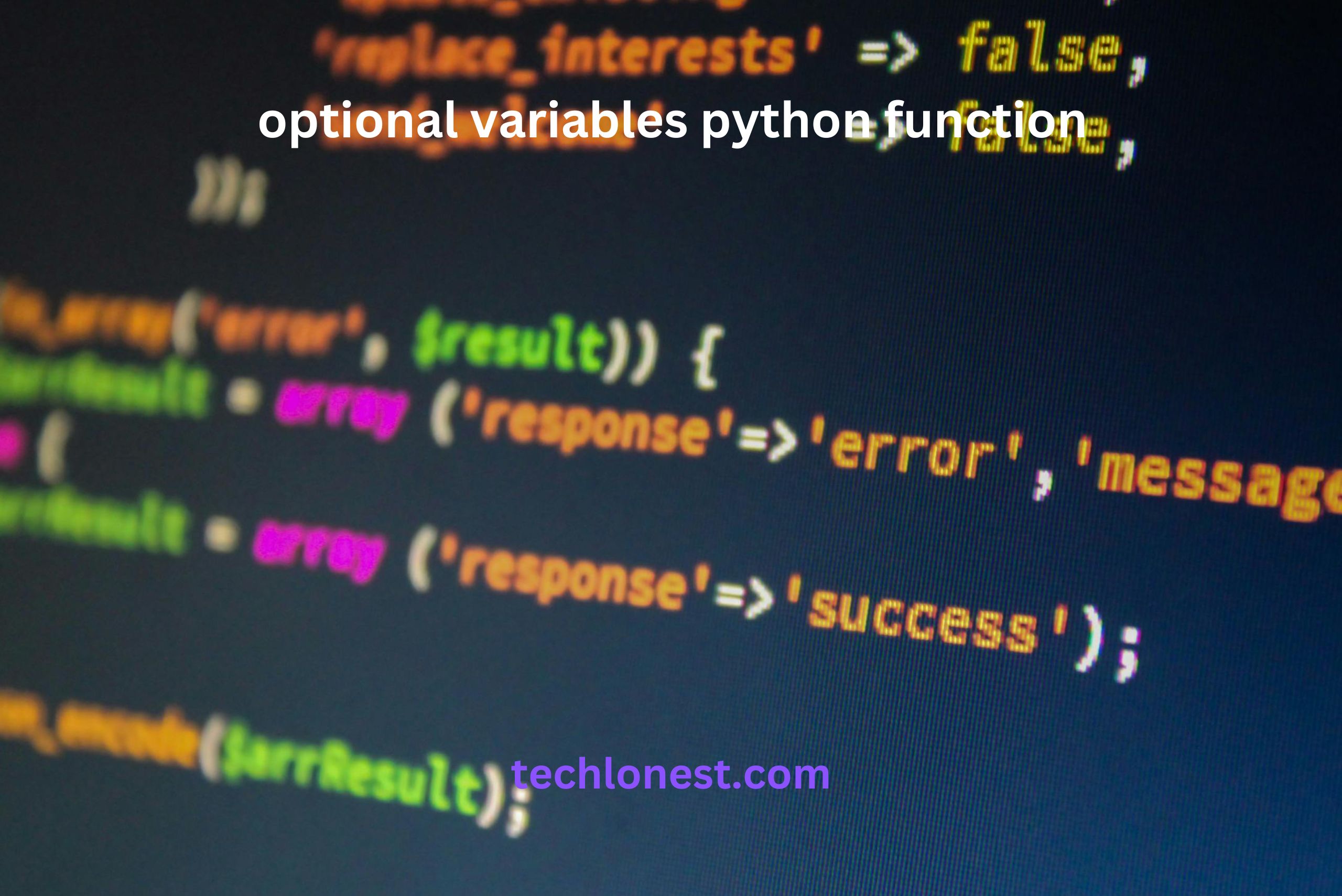Functions are an essential building block of programming in Python, enabling you to write reusable and modular code. However, not all function parameters need to be obligatory. Enter non-compulsory variables in Python features, a characteristic that makes capabilities more bendy and consumer-pleasant.
In this manual, we’ll discover what optionally available variables in Python capabilities are, the way to use them, and exceptional practices for imposing them in your code.
What Are Optional Variables Python Functions?
In Python, an optionally available variable refers to a feature parameter that doesn’t want to be explicitly furnished on every occasion the function is called. If you pass this parameter, the function will use a predefined default value.
For example:
python
def greet(call="World"):
print(f"Hello, call!")
greet() # Output: Hello, World!
Greet("Python") # Output: Hello, Python!
In this situation:
callis an elective variable.- If you don’t bypass a value, the feature uses the default cost
"World".
This method simplifies coding using permitting flexibility whilst retaining functionality. Learn more about Python feature arguments.
Why Use Optional Variables Python Functions?
Using non-compulsory variables enhances your code in several methods:
- Flexibility: Functions can cope with a couple of eventualities with fewer arguments.
- Readability: Default values explain the parameter’s expected conduct.
- Convenience: Reduces boilerplate code by way of warding off specific parameter tests.
How to Define Optional Variables Python Functions
Let’s ruin down the exclusive approaches you can outline and use elective variables.
1. Default Parameter Values
The maximum truthful way to outline a non-obligatory variable is by assigning it a default fee inside the characteristic signature.
Example:
python
def upload(a, b=0):
go back a + b
print(upload(five)) # Output: 5 (b defaults to 0)
print(upload(5, three)) # Output: eight (b is ready to 3)
Here:
- The parameter
bis optionally available as it has a default price of0. - If
bis not explicitly supplied, the default price is used.
2. Using None as a Default Value
When a meaningful default cost is unavailable, you can use None it as a placeholder. This method helps you to conditionally take care of the parameter’s absence.
Example:
python
def send_email(situation, body, recipient=None):
if recipient:
print(f"Sending e-mail to recipient: problem - body")
else:
print(f"Sending email to default recipient: problem - frame")
send_email("Update", "Project completed") # Uses default recipient
send_email("Update", "Project completed", "john@instance.Com") # Sends to John
In this example:
recipientis elective.- The characteristic behaves differently depending on whether
recipientis provided.
3. Using Variable-Length Arguments (*args and **kwargs)
In eventualities where you don’t realize the precise quantity of arguments your function will get hold of, you can use:
*argsfor positional arguments.**kwargsfor keyword arguments.
*args Example:
python
def multiply(*numbers):
end result = 1
for num in numbers:
end result *= num
go back result
print(multiply(2, 3, 4)) # Output: 24
print(multiply()) # Output: 1 (works in spite of no arguments)
**kwargs Example:
python
def display_info(**information):
for key, value in info.Gadgets():
print(f"key: cost")
display_info(call="Alice", age=25, position="Developer")
Learn greater approximately *args and **kwargs.
4. Combining Required and Optional Arguments
You can mix required arguments, non-compulsory arguments, and variable-length arguments in an unmarried characteristic. The accurate order is:
- Required positional arguments.
- Optional arguments with default values.
*argsfor extra positional arguments.**kwargsfor extra keyword arguments.
Example:
python
def create_profile(name, age, u . S .="Unknown", *abilities, **additional_info):
print(f"Name: name, Age: age, Country: us of a")
print("Skills:", ", ".Be part of(abilities))
for key, fee in additional_info.Gadgets():
print(f"key: cost")
create_profile(
"John", 30, "USA", "Python", "Django", experience="five years", hobby="Reading"
)
This technique ensures your function is both flexible and clean.
Best Practices for Using Optional Variables Python Functions
- Choose Meaningful Defaults: Use default values that make sense for maximum situations.
- Avoid Mutable Defaults: Mutable objects (e.g., lists, dictionaries) can cause unexpected conduct.
- Example of a Mistake:
python
def add_item(item, item_list=[]):
item_list.Append(object)
go back item_list
print(add_item("apple")) # Output: ['apple']
print(add_item("banana")) # Output: ['apple', 'banana'] (unexpected conduct)
- Correct Approach:
python
def add_item(object, item_list=None):
if item_list is None:
item_list = []
item_list.Append(object)
return item_list
- Document Optional Parameters: Add clear docstrings to explain the conduct of optionally available variables.
- Use Keyword Arguments for Clarity: When calling functions with non-obligatory parameters, use keyword arguments to avoid ambiguity.
FAQs About Optional Variables Python Functions
1. What are elective variables in Python functions?
Optional variables are feature parameters with default values. They make parameters optionally available throughout feature calls, enhancing flexibility.
2. How do you make a parameter non-obligatory in Python?
You can assign a default fee to the parameter within the feature definition:
python
def greet(name="World"):
print(f"Hello, call!")
3. Can you blend required and elective arguments in Python?
Yes, however, required arguments ought to precede optionally available ones in the characteristic definition:
python
def instance(required, optional="default"):
pass
4. Why is the usage of mutable defaults for non-obligatory variables a terrible idea?
Mutable defaults like lists or dictionaries are shared across function calls, causing sudden behavior. Instead, use None and create the object in the function.
5. What are *args and **kwargs in Python?
*argslets in passing a variable wide variety of positional arguments.**kwargspermits passing a variable variety of keyword arguments.
Learn greater about *args and **kwargs.
Conclusion: Mastering Optional Variables in Python Functions
Understanding and the use of elective variables in Python capabilities is a key ability for writing flexible, easy, and green code. By incorporating default parameters, None, or variable-duration arguments, you can handle diverse situations effectively.
Apply these concepts to your projects, and also you’ll quickly see how they simplify your code. Keep practicing and refining your talents—glad coding!

Leave a Reply